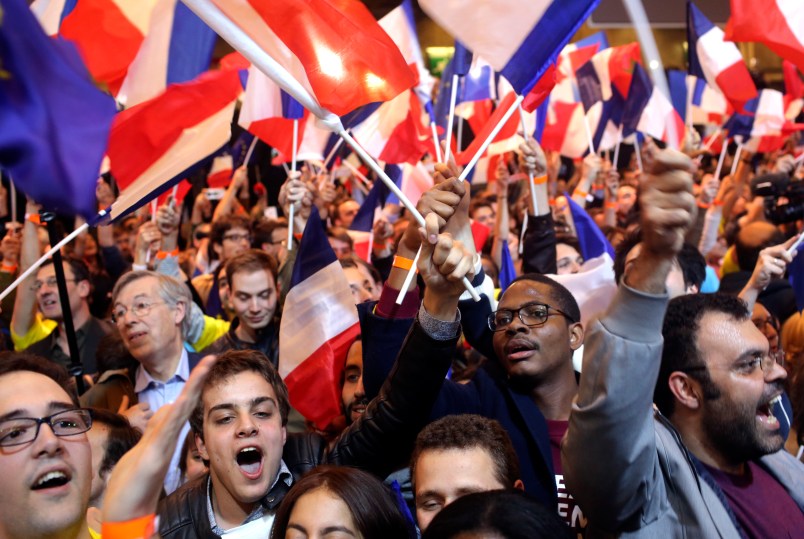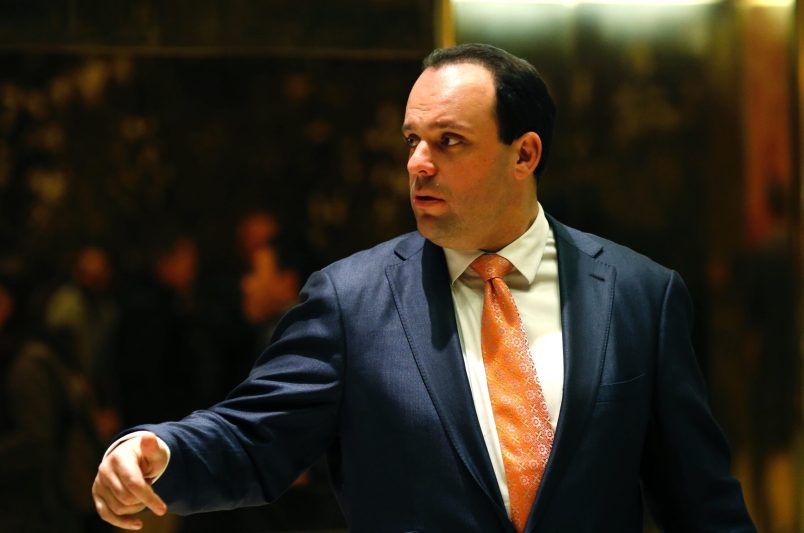France’s results on Sunday are certainly welcome. In the December 2015 regional elections, Marine Le Pen’s Front National came in first in the first round with 28 percent. As late as this March, she was nudging 30 percent in presidential polls. If you figured that in the run-off, she would get some of the votes that might have gone to the conservative candidate Francois Fillon, Le Pen looked like she could get 45 percent of the vote. And who knows – a big terrorist attack, a scandalous revelation about her likely opponent, Emmanuel Macron, and she could be France’s next president.
But as the election results Sunday confirm, Le Pen lost ground in the last month. She may have suffered from her association with Donald Trump, who is very unpopular in Western Europe. In the Dutch election, rightwing populist and an Islamophobe Geert Wilders’ poor showing may have been because voters linked him to Trump. If you look at the polling results from then until now, Le Pen might have even lost working class votes, especially among the young, to leftwing populist Jean-Luc Melenchon, who shared her support for boosting social services, taxing the wealthy, and opposition to the Euro and the European Union’s budgetary restraints.
During the last three weeks, Le Pen de-emphasized economics, including her opposition to the Euro, in favor of hardline, cultural nationalism. “In France,” she declared, “we drink wine whenever we want. In France, we do not force women to wear veils. We get to decide who deserves to be French.” That stance – not by any means new to Le Pen, but as a matter of emphasis — may have narrowed her support to her core voters who probably don’t number more than a quarter of the electorate. In the end, Macron bested Le Pen by 24 to 21 percent.
In the May 7 runoff, Le Pen will probably attack Macron as a elite neo-liberal, which, to a great extent, he appears to be. Macron, a former banker and a graduate of France’s prestigious Ecole Nationale d’Administration, advocates corporate tax cuts, reductions in the state workforce, and the removal of restrictions on employers to hire and fire. In her speech heralding her second place finish, Le Pen said:
The French people now have a very simple choice: either we continue on the path to complete deregulation, or you choose France. You now have the chance to choose real change … It is time to liberate the French nation from arrogant elites who want to dictate how it must behave. Because yes, I am the candidate of the people.
“Deregulation” in this sentence refers to economic and social deregulation – loss of national control over France’s economy and over who is allowed to live and work in France. But with Macron sporting endorsements from the Socialist and Republican parties – Melenchon was holding out until the very final results – and with the specter of Trump continuing to hover over Europe, Macron should be able to hold Le Pen to 40 percent or less of the vote. That will put a serious damper on the FN’s prospects.
But where will Macron’s likely victory in May leave France and French politics? Macron’s party En March (“on the move”) is barely a year old. He will probably have to join forces with the Socialists in the legislative elections in June and may not have a functioning majority in the legislature to get his policies adopted. And it’s not clear Macron’s policies will get France’s economy on the move.
France’s economy has not been growing. It grew .2 percent in 2015 and .6 percent in 2016. For the last five years, its unemployment rate has hovered around 10 percent. Its unemployment rate among youth 15 to 24 years old – a key constituency for Le Pen and Melenchon – has been 23.6 percent. France has high productivity, but as Thomas Piketty has pointed out, that’s because many of the less productive workers are unemployed.
Macron has described his own program as modeled on Nordic social democracy. That means flexible labor rules, but a strong safety net. So Macron says he wants more flexible employment rules, corporate tax cuts to encourage investment, along with extended unemployment compensation (that would include the self-employed and people who quit their jobs) and increased spending on a green economy and worker retraining. And he would couple that with renegotiating the fiscal pact with Germany and moving toward a strong fiscal-monetary union.
Macron’s program can’t be dismissed as vacuous centrism. If France were to adopt a more conventional leftwing approach and jack up consumer demand through increased spending, much of the consumer demand could be siphoned off into imports, particularly from Germany, which has similar productivity but lower labor costs than France, as happened in the early 1980s. France’s trade deficit would increase; interest rates would rise. And France would find itself under pressure from the EU to reduce public spending and consumer spending.
To get its economy moving, France would presumably have to convince the Germans to change their current practices, which hold down consumer demand and labor costs, creating a huge trade surplus at the expense of France, Spain, and Italy, among other countries. That would require, as Macron seems to be proposing, a new fiscal-monetary pact that would have to be initiated, as before, by the EU’s two leading countries, France and Germany. With such a pact, Macron’s Nordic economic model might work.
So, theoretically speaking, Macron’s strategy is not crazy. But would it work? There might be a chance if the Germans were willing, and they might be willing if the Social Democrats were able to lead a majority coalition after this September’s election. But Angela Merkel’s Christian Democrats are currently leading in the polls. If Le Pen has suffered from Trump’s unpopularity, Merkel had undoubtedly benefited from it. And Merkel is much less likely to make serious concessions to Macron and France.
Without such a deal, however, Macron’s Nordic Social Democracy looks a lot like what Hollande attempted to do during his last three years in office – with dire results. In that case, to quote Bob Dylan, France would be back in Mobile with the Memphis Blues again, and five years from now would face another topsy-turvy election.







